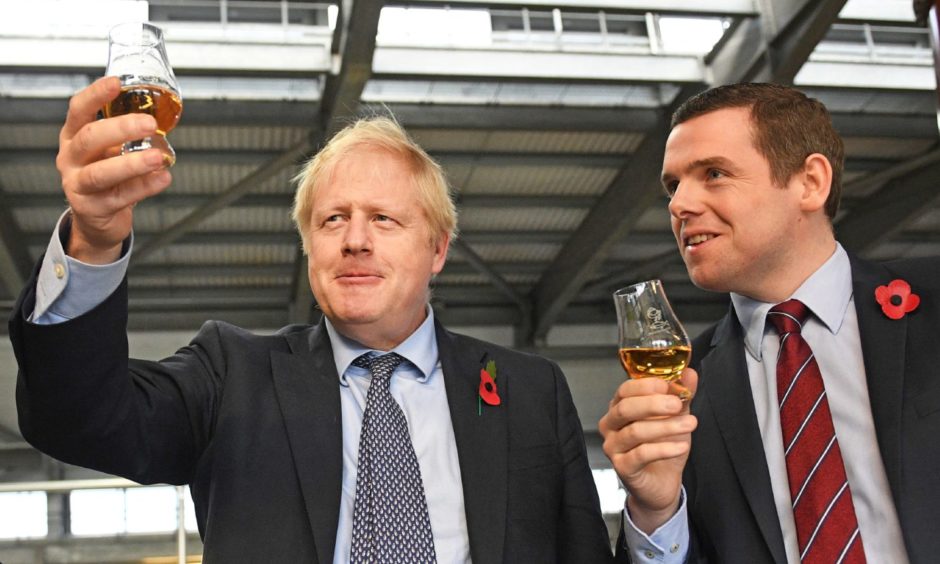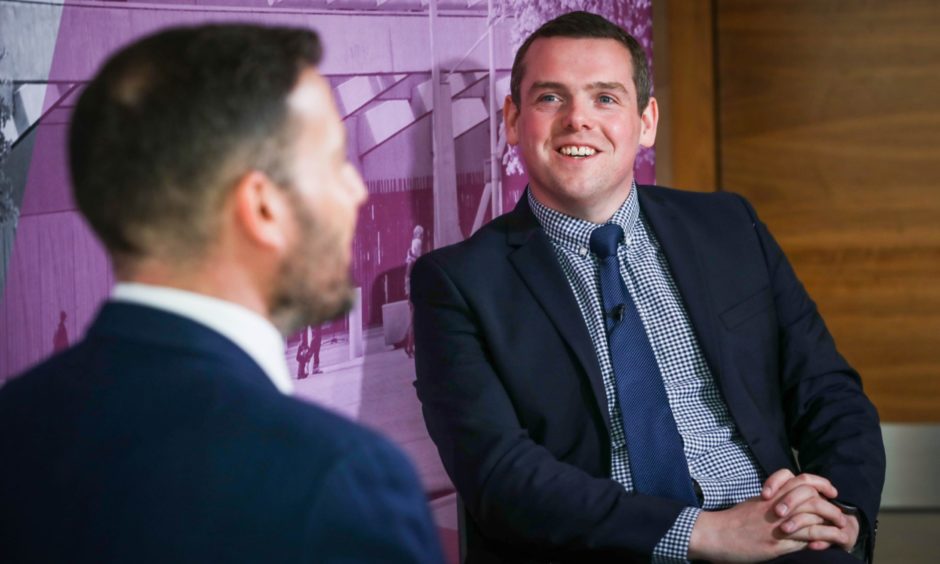Scottish Conservative leader Douglas Ross has claimed the pro-unionist parties have to “get their act together” if they are to face the “threat of nationalists trying to game the system”.
In an exclusive interview with The Courier editor David Clegg, the Moray MP said unionist parties working together is the “tried and tested model” to stop a second independence referendum, as he admitted one could come forward in the next parliament.
Mr Ross revealed he and Prime Minister Boris Johnson text “semi-regularly” but denied suggestions he had told the Prime Minister to stay away from Scotland ahead of the May 6 election, instead maintaining that the Prime Minister’s absence is down to “leading the UK’s fight against Covid-19”.
This is despite Mr Johnson making a controversial trip north of the border in January, at the height of the coronavirus pandemic, amid speculation his no-show has more to do with his low popularity ratings.
The Scottish Conservative leader said he has been having “discussions” with Mr Johnson over the future of the union and claimed the Prime Minister is “right behind” the aims of stopping an SNP majority.
In our interview, Mr Ross refused to outline in what circumstances a second independence referendum could be held and said he would “always campaign against one”.
The Prime Minister has previously said he will block a second Scottish independence referendum, claiming that the issue was settled in a “once in a generation” vote in 2014.
When asked why voters need to cast their ballot for the Scottish Conservatives to block a second independence referendum, in light of Mr Johnson’s comments, Mr Ross said: “The SNP have said they will ignore what Westminster has said and will go ahead with an illegal wildcat referendum. They issued an 11-point plan.
“When we were still locked up at home, they were telling us how they would have another independence referendum.
“Nicola Sturgeon has confirmed in this election campaign that she wants to hold the referendum in the first two years of this parliament and she’s accepted that’s during the recovery phase.
“So even if the Prime Minister refuses it, if a request goes in for a section 30 order, the SNP are saying they will still go ahead and hold an illegal wildcat referendum.”
The Scottish Conservative leader said he was “not as surprised as I should have been” about the emergence of Alex Salmond’s Alba Party.
He thinks the former first minister’s return to politics has “reinforced the message that nationalists of whichever party simply want this election to be about another independence referendum”.
Mr Ross also revealed that he thinks Brexit has had a “net benefit” due to the “clear benefits with the vaccination programme” but denied he was paying lip service to political projects he does not necessarily believe in.
The Moray MP, who is standing for election in the Highlands and Islands regional list rather than the Moray constituency he represents at Westminster, rejected the suggestion that he might be running scared from SNP candidate Richard Lochhead, who has represented the seat since 2006.
He pointed to his defeat of former SNP Westminster leader Angus Robertson in the 2017 General Election in defence of any accusations he is not up for the challenge and said that when he became leader in August last year, the party already had a candidate in Moray councillor Tim Eagle, and he “felt it was wrong to tell him to stand down”.
The Scottish Conservative leader intends to remain as MP for Moray, while also leading the party and serving as an MSP if elected, but he said that three of the last five first minister’s show it is possible.
‘Deep regret’
Mr Ross denied there is a “darkness” about his politics, following remarks made by Scottish Liberal Democrat leader Willie Rennie, whom the Tory leader described as “looking for a bit of attention”.
Not for the first time, he said he “deeply regrets” comments he made about Gypsy/ Travellers in 2017 in which he was asked what he would do if he was made “Prime Minister for a day” and said his number one priority would be “tougher enforcement on Gypsy/Travellers”.
In our interview, Mr Ross said that if he “could turn the clock back and give any other answer then I would because I know it caused hurt and understandable anger, which still exists in the Gypsy/Traveller community”.
On what his policies in this area would be now, the Scottish Conservative leader said there has to be work to integrate official sites in local communities to ensure there are “stop-off sites” across Scotland rather than “leaving it to unauthorised, illegal sites”.
Self-ID
The debate around the controversial Gender Recognition Act (GRA), which would allow people to self-declare their gender identity, is due to reignite in the next parliament.
The reforms were paused in Scotland at the beginning of the pandemic, with similar plans dropped by the UK Government in September.
Asked about his party’s position on the issue, Mr Ross said he wants to “see what comes back in the next parliament”.
The Tory leader added it is important to come up with a solution that “understands the needs of those on all different spectrums of the debate”.
He said: “I think it’s natural for a Conservative to say that people have to be comfortable in how they identify themselves but that should not not make others uncomfortable in terms of men who self-identify as women then using women’s changing facilities or women’s bathrooms, that is an issue that still understandably upsets many people.”

